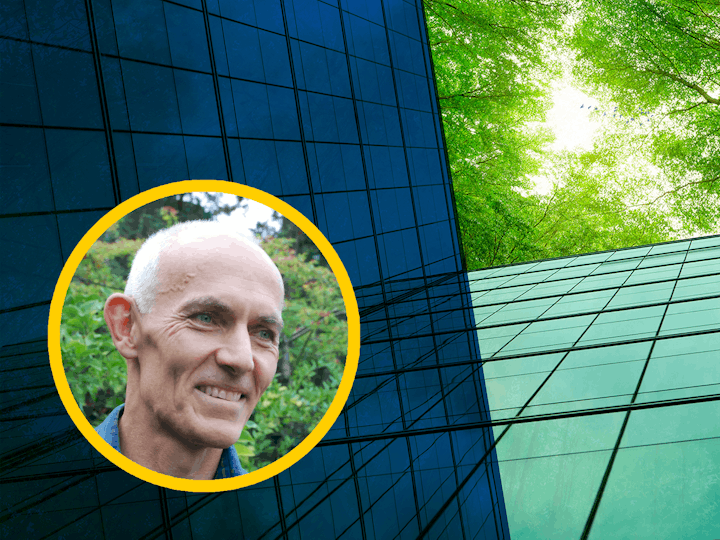Transforming for sustainability
The required transformation in society to deliver sustainability relies on navigating a complex set of interrelated issues. Innovative firms which anticipate the coming changes will have huge opportunities to exploit – and doing so can be very profitable for those up to the challenge. Lazy businesses, doing well in the current economy, will be hit hard.

Business leaders are becoming confident to set a direction using sustainability as their compass and incorporating it as a central component of strategy. However, there are multiple threats and opportunities to navigate, with no single way forward. Here, Peter offers four insights to bring a degree of clarity to this complexity.
Dr Peter McManners, Strategy and Sustainability, Henley Business School
Resilient Economics: Finance, Society and the Environment by Peter McManners (published April 2022, Susta Press).
The case for sustainability to underpin human society over the long term is rock solid. Delivering such aspirations requires a transition to a sustainable economy – which will be quite different to the economy of today. This transformation is a complex challenge, driven by competing dilemmas which can seem so difficult as to be impossible. It certainly will not be simple or easy. For example, transitioning away from fossil fuels will require the complete reconfiguration of energy systems. In navigating transition, the truly sustainable solution is not always obvious, but that is where business can thrive. Doing difficult stuff, for which there is a real need, can be hugely profitable for those firms which are up to the challenge.
How did we get here?
The intensity of the challenge arises from the path that industrialisation has taken without considering the environmental consequences. This has led the world to a difficult juncture where a new direction is required. The current economic track focused on growth and increasing consumption can only ever bring short-term success. On a planet of seemingly limitless resources, this truth has been obscured. As the world comes up against resource limits, and as the consequences of climate change start to bite, the reality of the situation is exposed.
The industrialisation has been facilitated by easy access to energy when and wherever it is needed. For decades the world has been able to satisfy energy needs by digging more coal, pumping more oil, or piping more gas. There remain ample reserves of fossil fuel, particularly coal, which could last for many more decades. Fossil fuel dependency will not be cured because reserves run low but because we choose to change direction. A slow realisation is dawning – the reserves yet to be exploited should be left underground.
The role of manufacturing
At the heart of the industrial economy is manufacturing. Over recent decades, it has become lean and ultra-efficient, but this brings its own problems. Long supply chains source components from faraway places where costs are low. These are delivered just-in-time to avoid tying capital up in inventory. Never before has business been able to manufacture at such low cost and sell so cheaply. From the blinkered perspective of maximising short-term profit, there has been a commercial incentive to limit product life to bring forward the next sale. For the same reason, products are designed to be irreparable. It has become accepted to manufacture in China – or some other low-cost economy – and then ship to market. Persuasive marketing encourages consumers to upgrade to the newest gizmo, disconnected from any real need. When the product is no longer desired, it ends up in the rubbish collection system. The current business model could be described as make–ship–sell–junk, but this way of serving consumers will become obsolete.
How sustainability transformation can change everything
The elimination of fossil fuel and the implementation of a circular resource system are radical changes. The result is a completely different economy and a totally transformed business landscape. Lazy businesses, sitting on their laurels doing well in the current economy, will be hit hard. Innovative firms which anticipate the coming changes will have huge opportunities to exploit. It is not about doing more, cheaper but about doing less, better – and maintaining profitability. The required transformation in society to deliver sustainability relies on navigating a complex set of interrelated issues. It is challenging to realise that everything must change but accepting this is to begin the sustainability journey. For business, there are multiple threats and opportunities to navigate, with no single way forward. I offer four insights to bring a degree of clarity to this complexity.
1. Realise that sustainability is not a passing fad.
It is not hyperbole to state that a future which is not sustainable would eventually see the collapse of civilisation. People might be slow to wake up to reality, and it is human nature to be resistant to change, but humanity does, in the end, find a successful way forward. It is reasonable to assume that embedding sustainability into the economy will be a fundamental plank for our long-term future.
2. Understand the parameters of sustainability
Do not fall into the trap of thinking that marginal change is all that is required. Low carbon emissions, great resource efficiency, low environmental impact – these are terms now widely used. These are simply stages on the journey. To get on a secure sustainable path requires the adoption of long-term aspirations: cure fossil fuel dependency, implement total resource circularity, and eliminate negative environmental impacts.
3. Be in the driving seat of the sustainability transformation
Think strategically – it is tempting go with the flow and do only what is needed when it is required by legislation. This unambitious approach can be left to the operations team to monitor and action. Strategic thinking encourages greater ambition than this. Being a step ahead of others in the industry is to be in control of the firm’s destiny. Of course, it is also the case that being a step behind means being left behind.
4. Timing is critical
Move too fast, and the business could be exposed by investing too much too soon. Move too slow, and the best opportunities will be missed. The best strategic choice is often to do the deep thinking, decide what is likely to be needed, and make carefully targeted seed investments so you have options for large-scale investment when the timing is right.
Sustainability at the heart of business
Some of us have been investigating the parameters of the sustainable revolution as a strategic issue for decades, but the concepts have been slow to migrate into mainstream business. This is changing. Recent years have seen sustainability begin its migration from being a peripheral activity, with its home somewhere within corporate affairs, to a more central component of strategy. Business leaders are becoming confident to set a direction using sustainability as their compass; this will help them navigate the next disruptive evolution of the industrial economy.
This article is one of a series exploring the challenges of business transformation.
Visit Improvement Leader Apprenticeship | Managing Business Transformation to read more and discover how Henley’s apprenticeships can drive strategic change and improvement.
- Are psychopath leaders stifling sustainability and business transformation?
- Can your company survive and thrive in today’s evolving business environment?
- Data doesn’t have to be big to be clever! Why small data is a change agent’s best friend
- Business transformations – why you need to change your mindset to change your fortunes
- Many boards are abdicating their ESG responsibilities – they need to wake up to the realities of sustainability



